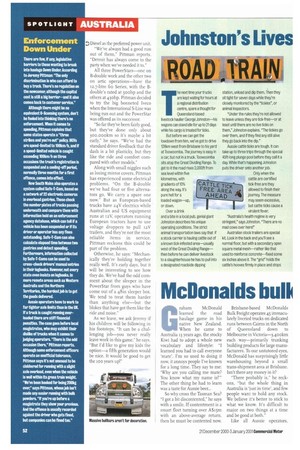Enforcement Down Under
Page 54

If you've noticed an error in this article please click here to report it so we can fix it.
There are few, if any, legislative barriers to those wanting to break into haulage Down Under. According to Jeremy Pittman: "The only discrimination is who can afford to buy a truck. There's no regulation on the newcomer, although the capital cost Is still a big barrier—and it also comes back to customer service."
Although there might be no equivalent 0-licensing system, don't be fooled into thinking there's no enforcement. When it comes to speeding, Pittman explains that some states operate a "throe strikes and you're out" policy. HGVs are speed-limited to 100km/h, and if a speed-limited vehicle is caught exceeding 100km/h on three occasions the truck's registration is suspended and a cooling-off period, normally three months for a first offence, comes into effect New South Wales also operates a system called Safe-T-Cam, based on a network of 22 electronic cameras in overhead gantries. These check the number plates of trucks passing underneath and compare them with information held on an enforcement agency database, which can tell if a vehicle has been suspended or if its driver or operator has any fines outstanding. Safe-T-Cam can also calculate elapsed time between two gantries and detect speeding. Furthermore, information collected by Safe-T-Cams can be used to cross-check drivers' manual entries in their logbooks. However, not every state even insists on logbooks. In more remote areas such as Western Australia and the Northern Territories, the hardest Job is to get the goods delivered.
Aussie operators have to work to Far tighter axle limits than in the UK. If a truck is caught running overloaded there are stiff financial penalties. The case goes before local magistrates, who may exhibit their disINie of trucks when it comes to judging operators. "There is the odd occasion there," Pittman reports. Although some enforcement officers operate an unofficial tolerance, Pittman says it's not unusual to be clobbered for running with a slight axle overload, even when the vehicle is well within its gross train weight "We've been booked for being 200kg over," says Pittman, whose job isn't made any easier running with bulk powders. "If you're up before a magistrate they show your previous. And the offence is usually recorded against the driver who gets fined, but companies can be fined too."








































































































































